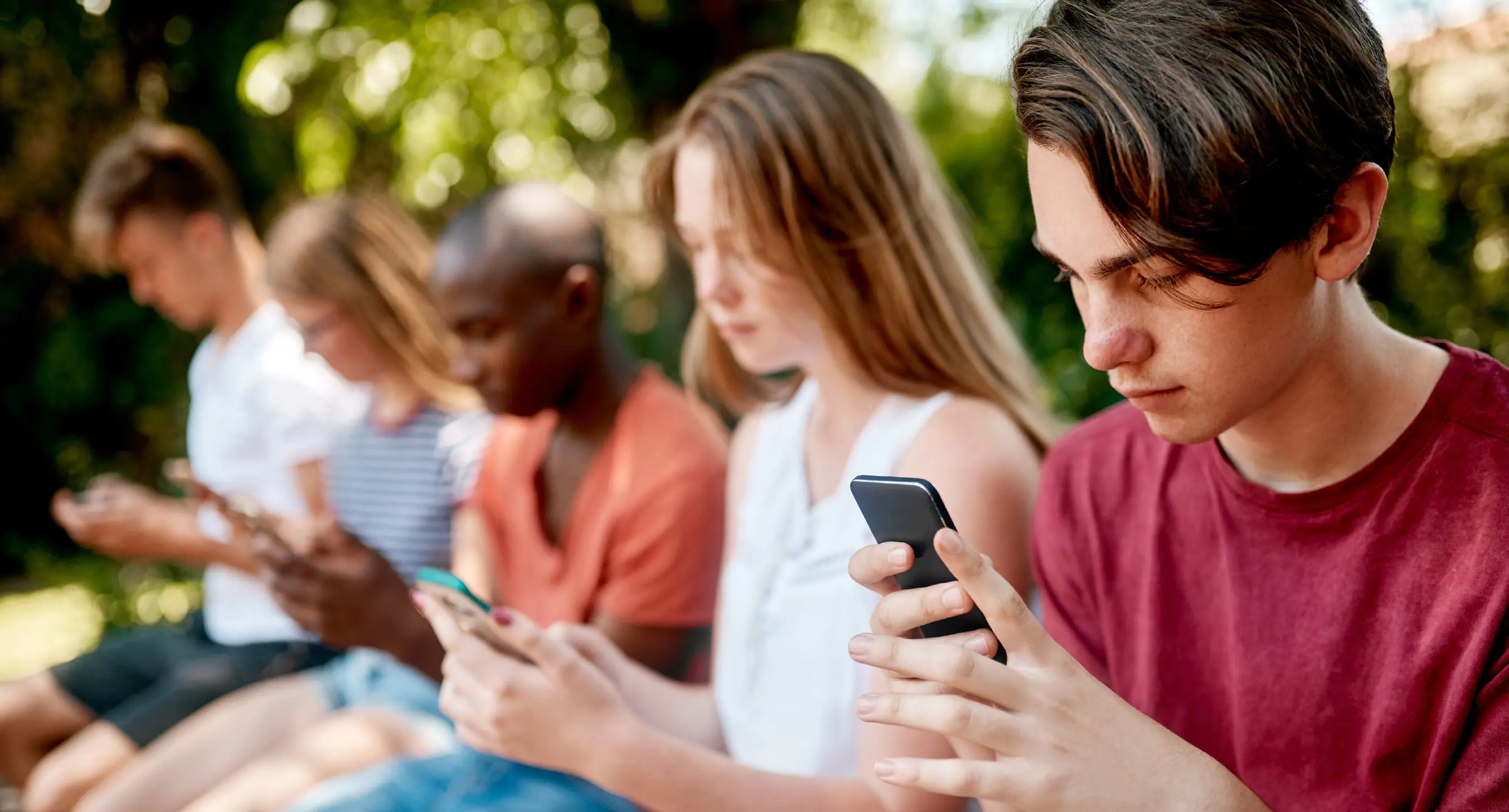Join the Movement - Sign the Delay Manifesto 📑


What’s the Right Age to Give my Kid Social Media?
Back in 2015, the conversations around smartphones, social media, and parenting was pretty lonely! We are glad that so many more families, tech advocates, and caring adults across the globe are spending time trying to understand how to protect and prepare their children in the digital age.
We hope this post helps your family understand the complexities and naunces involved in this big decision!
Is My Kid Ready for Social Media?
At Protect Young Eyes, we speak to a group of parents almost every week. And this is one of the most common questions we get asked.
This is actually the wrong question. We think there are other, more important questions that should be asked first. We have a list of six questions that we’ve found to be helpful in making an accurate assessment.
First, let’s start with the government’s answer to this question.
What does COPPA say about Social Media and Age?
The Children’s Online Privacy and Protection Act (COPPA), which has been in effect since 2000, protects the private, identifying information about children under age 13. This has become the standard for social media giants like Facebook, Instagram, and Snapchat, require users to create a profile that includes personal, private information.
Even though this act has been around for over a decade, we are shocked at how few parents enforce any kind of minimum age for when their kids open up their first social media account. Whenever we speak to children in grades 3-7 (ages 8-12), we always ask them, “how many of you have a social media account of your own right now?” And, at least half the room routinely raises hands.
This isn’t a social media issue. This isn’t a kid issue. This is a parenting issue. Parents are telling their kids that it’s okay to lie. Parents are tossing their kids into a dangerous pool of risk without a life jacket. This is not okay.
What Do Others Say?
- In May of 2023, Dr. Vivek Murthy, the US Surgeon General, issued a health advisory on the effects social media has on youth mental health.
- A year later, in June of 2024, Dr. Murthy continued in this direction and called for “Warning Labels” on Social Media – similar to the authority of labels that were put on cigarettes.
- In March of 2024, Jonathan Haidt released a book that created waves across the US. “The Anxious Generation” suggests how childhood in the US went from “play-based” to “phone-based”. Jon lays out 4 reforms to our society, one of which is that parents wait until their child is 16 before allowing social media.
- In September of 2025, Jean Twenge continued being a strong voice in the field of kids and social media. She offers wonderful tips and sound advice.
- In October of 2025, Jonathan Haidt's Substack, "After Babel," posted about the connection between social media use and depression. Data from the Adolescent Brain Cognitive Development (ABCD) Study (a decade long study tracking over 10,000 kids from 2015-2016), helped link social media use and symptoms of depression.
- WaitUntil8th is a wonderful organization that seeks to help parents wait until 8th grade before giving their kids addictive technologies.
6 Key Questions about Your Child – Are they Ready for Social Media?
Although age is one factor in determining whether or not a child is ready for the pressures and risks of social media, it’s only one of many variables that should be considered. At Protect Young Eyes, we operate under the assumption that no child for any reason should be using social media prior to age 13. Turning 13 is the minimum requirement, and is in no way an automatic approval for Instagram or anything else.
Because, remember, age alone is the wrong question.
The right question goes something like this, “What digital decisions give my child the best chance at the most fulfilling childhood?”
This elevates the question.
And, in order to answer that question well, it requires you to truly know your child. Study your child. Analyze the behaviors of your child. It requires parents to be observant, engaged, and informed. Here are six questions to consider:
1. What are their friendships/social skills like?
Because if friendships in real life have any level of drama, trauma, or tension, then those friendships will ignite on social media. Remember, social media is like gasoline for cruel behavior.
Can your child carry on a meaningful, human-to-human conversation with a non-parent adult? If not, then they are not ready for social media. This is why we have all of our children order their own food at restaurants, shake hands, look people in the eye, speak confidently to adults, and these are behaviors we practice. I want them to master the face-to-face long before they’re tested on the screen-to-screen.
2. How well do they obey rules?
Every kid pushes back at least some, but there is a level of defiance that rises above just normal teen disobedience. Is there deception? Regular lying? If yes, then they are not ready for social media.
3. Do they have a strong heart?
I’m not referring to the way that her heart pumps blood through her body, but rather, is your child self-confident? Or, is he/she adrift in their identity, uncertain as to who they are or why they exist?
Ask your son or daughter to name three amazing things about themselves. If they can’t do this, then they’re not ready for social media. Think about Instagram for a minute – how many 13-year-old girls are truly ready for “the whispers of Instagram?”
The whisper that says, “skin and sexy = followers and likes.” The whisper that shows them an endless stream of perfectly polished pictures, with a subtle message about true beauty that is truly only skin deep. The whisper of female comparison lurks HEAVY on Instagram, and I know few 13-year-old girls who are ready for that.
4. Are they trustworthy?
For example, is she trusted to take care of young children? Can your son or daughter stay home alone for two straight hours without any contact from you? If not, then they are not ready for social media. If he/she can’t handle two hours alone in the real world, then he/she can’t handle 2 minutes alone in the social media world.
5. Are they at least 13 years old?
I know, I’ve said this multiple times. Until the third graders we speak to stop raising their hands when asked if they have a social media account, I’m going to keep asking this question.
Kids who begin using social media before turning 13 are beginning their journey into the social media ecosystem as a lie, and worse yet, one that is often condoned by parents.
NOTE: at Protect Young Eyes, we advocate for at least age 16 for all social media platforms, including Snapchat and Instagram.
6. Have you had direct and frequent conversations about awkward things?
I’m talking about the big three: sexting, pornography, and sexual predators. Before using social media, your child needs to have heard these words for years and know exactly what they mean and what to do when confronted by situations that involve them.
Go through every possible “what if?” scenario and ask yourself, “have we talked about that?” Does he/she know what to do when they see porn? (because they will) Does he/she know what a sexual predator is, can recognize the signs, and is confident enough to know what to do when approached by someone online? (because eventually, it will happen). If not, then your son or daughter is definitely not ready for social media.
Social media frequently asked questions
Q: Can’t They Just Create a Secret Social Media Account?
A: The simple answer to this question is, “yes.” There are doorways to the internet everywhere and parents cannot control them all. But if we call out those doorways and loopholes, we often land in a better spot. Consider an approach like this:
Keep that doorway to conversation wide open. I find that whatever gets talked about openly and honestly usually has less deceptive power over us. For example, a conversation with your daughter might be: “Honey, you and I both know that you could create five different Instagram accounts without me ever knowing about it. But, I really don’t want you to do that. We have built up trust and I want to keep that.”
Q: My 11-year-old Already Has Social Media. What Now?
A: The answer to this question is mostly up to you. I’m not so heartless as to suggest that every parent in this situation should just automatically grab their kid’s phone and delete their social media accounts.
But, once you’ve assessed the potential risk, maybe after reading our write-up about the app, a very loving and direct conversation should take place. The result of the conversation might be a decision to allow the social media access to remain, but with new parameters. The result could also be a lot of tears and some tough love. Either way, this is an opportunity for loving, firm, and confident parenting, which is absolutely necessary when there is so much on the line.
How powerful would it be to say to your child, “Honey, I’m not a perfect parent and I messed up. I should have protected you better, but I did not, and for that, I’m sorry. You are trustworthy, but I don’t trust the one billion other people on Instagram every month who don’t care that much about you.
At least not how I care about you.
I want to keep you safe wherever you go and the includes where you go online. I should have done a better job but I did not and now I need to make things right. Will you be able to use social media again in the future? Yes, probably, yes. But, we need to start over and do this right because you’re worth it.”
Open and honest. This is the right place to be.
Q: So, How do I Train My Child to Use Social Media?
A: This one takes a bit of explanation, but I’m glad you asked because this is really important. I realize that thus far, what I’ve suggested is radically different than how many families currently operate. But, I believe it’s time to crush the idea that social media is an entitlement. Instead, I believe that much like the process we use to teach our children how to ride a bicycle, we can teach out children how to use social media.
Think of all the precautions that go into teaching a child how to ride a bike. Then, ask yourself, “what if I was that intentional about teaching my child how to use social media?” These three prep steps will help:
Consider a social media & smartphone progression:
- My child uses my social media account on my (parent) phone. Maybe we post a picture together and talk about it.
- My child opens up their own social media account but only uses it on my phone.
- My child gets their own device without social media (Gabb) but has a few apps.
- My child gets their own device with social media and the parent is also logged into the child’s account from my device.
- I just follow their account from my phone and I promise not to embarrass them on their account.
Try Out Every Social Media App Before Your Kid Does.
We call this the “7 Day Rule.” Meaning, before you let your child use a specific app, try it out yourself for 7 days. Create a test account using your child’s age and gender, and then use the app on that account for one week.
Actually use it. Poke around. Create a profile. Like a few things. Poke around in the settings. Pay attention to the notifications it generates. Some apps have intelligence build into them that show you more over time. That’s why we recommend seven days. Then, at the end of seven days, ask yourself, “can my kid handle everything I just experienced?”
Monitor Social Media Activity – As Much As You Can.
BARK is the only solution that we recommend for monitoring social media activity. This is because they’re the only ones that have created a solution that allows kids to use it and also alert parents when their algorithm senses something wrong. Just like a dog who might bark. (Now you get it!)

Concluding thought – It’s OK to wait on Social Media. #delayistheway
I know that for some parents, this is going to be a major source of conflict. They will seem like “the only parent” who doesn’t let their kid use social media. Again, I have to be direct and say that this is a parenting issue. The stakes are high. Stick to your guns. You do have allies in this fight to push against a culture that wants to put a phone and a social media account in every child’s hand. Check out our private community (The Table) listed below to stay connected with like-minded parents.

What if I have more questions? How can I stay up to date?
Two actions you can take!
- Subscribe to our tech trends newsletter, the PYE Download. About every 3 weeks, we’ll share what’s new, what the PYE team is up to, and a message from Chris.
- Ask your questions in our private parent community called The Table! It’s not another Facebook group. No ads, no algorithms, no asterisks. Just honest, critical conversations and deep learning! For parents who want to “go slow” together. Become a member today!

A letter from our CEO
Read about our team’s commitment to provide everyone on our global platform with the technology that can help them move ahead.
Featured in Childhood 2.0
Honored to join Bark and other amazing advocates in this film.
World Economic Forum Presenter
Joined a coalition of global experts to present on social media's harms.
Testified before Congress
We shared our research and experience with the US Senate Judiciary Committee.


















